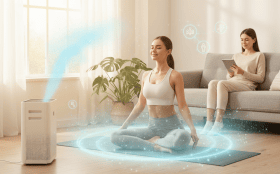![[MK] Drafts: The Benefits Of An Air Purifier](https://www.market.com/wp-content/uploads/2025/11/-mk-drafts-the-benefits-of-an-air-purifier-1.jpeg)
Whether it’s pollution, allergies, pet dander, or just wanting to breathe cleaner air, more people are turning to air purifiers to improve the air quality in their space. Using a special fan and filter system, air purifiers draw in air from your environment, which then passes through a special filter, trapping harmful microparticles and releasing clean air back into the room.
This guide explains the benefits, limitations and truths about air purifiers, so you can decide if you need one in your home.
Air Purifier Pros & Cons
Air purifiers offer practical benefits that can enhance your indoor environment and overall health. Here’s how they can help:
- Remove allergens: They capture pollen, pet dander, and dust mites, helping to reduce asthma and allergy triggers.
- Reduce airborne dust: By trapping dust, they keep surfaces cleaner and cut down on the need for frequent cleaning.
- Neutralize odors: Air purifiers help eliminate smells from pets, cooking, and smoke.
- Improve sleep quality: Cleaner air makes breathing easier, leading to better, deeper sleep.
- Remove some bacteria and viruses: Models with HEPA, UV, or carbon filters can trap microbes.
- Enhance air quality: Especially beneficial for homes with poor ventilation or in areas with high pollution levels.
While air purifiers offer many benefits, there are a few potential drawbacks to keep in mind before making a purchase:
- Initial cost: Some models, especially those for larger spaces or with advanced features, can be expensive.
- Regular maintenance: Filter replacements are necessary and can add up over time.
- Noise level: Certain models can be noisy, particularly on higher settings.
- Limited coverage: Air purifiers don’t remove dust buildup and may not be effective in heavily polluted rooms.
What Air Purifiers Can and Can’t Clean
To get the most out of an air purifier, it’s important to know what they can and can’t do:
Air purifiers can help with:
- Dust, pollen, pet dander, smoke particles, VOCs, and some airborne bacteria/viruses (with HEPA or carbon filters).
- Certain odors (like kitchen smells, smoke, and pet odors).
Air purifiers can’t help with:
- Mould growing on surfaces (they only filter spores in the air, not the mould itself).
- Heavy particles that settle quickly (like sand or debris).
- Gases not absorbed by carbon filters (such as carbon monoxide).
- High humidity or moisture (a dehumidifier would be more effective).
Signs You Might Need an Air Purifier
If you’re dealing with ongoing discomfort at home or have specific air quality concerns, these signs might mean an air purifier could help:
Signs you might need an air purifier:
- You often wake up with congestion or itchy eyes.
- You have pets and notice odors, sneezing, or pet hair all over the place.
- You or someone in your family has asthma or allergies.
- You live in a city, near busy roads, or somewhere with a lot of pollution.
- Your home gets dusty no matter how much you clean.
Types of air purifiers to consider:
- HEPA filters: Great for capturing allergens and dust, filtering out 99.99% of particles as small as 0.3 microns.
- Activated carbon filters: Best for getting rid of odors and VOCs.
- UV-C light purifiers: Target bacteria and viruses.
- Ionic purifiers: These aren’t as common anymore since they can create ozone, which isn’t great for your lungs.


